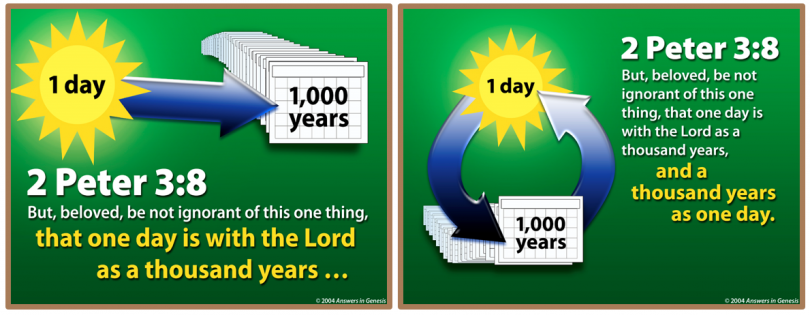Two elements are essential in any evolutionary/biblical intermingling whether Day Age, Gap Theory, Theistic or Atheistic evolution: First, the universe and the earth have existed for very long periods of time; and second, Darwinian common ancestry (so called molecules-to-man) evolution is true. (1)
“One day is with the Lord as a thousand years and a thousand years as one day.”
2 Peter 3:8
Peter is expressing in this passage that the passage of any amount of time is meaningless to an all powerful God. The same God who created everything including time itself.
The next passage explains the context
The Lord is not slack concerning His promise (second coming), as some count slackness, but is longsuffering toward us, not willing that any should perish but that all should come to repentance.”
2 Peter 3:9
This verse clearly explains that the evidence that Jesus has not yet returned is not indication of any delay but is actually a blessing for everyone that has not yet been saved. Everyone who has coming to a saving knowledge of Jesus since this time would have to agree!
This is not the only passage used to explain the hypothesis of The Day Age theory. This theory, much like the Gap Theory, proposes creation week as periods of undefined duration’s. Day-age advocates claim the sequence of creative activities defined in Genesis match the sequence of events as deciphered by astronomers and geologists.
Days of Creation:
1- Light
“Then God said, ‘Let there be light’; and there was light. And God saw the light, that it was good; and God divided the light from the darkness. God called the light Day, and the darkness He called Night. So the evening and the morning were the first day” (Genesis 1:3-5).

2- Atmosphere (Firmament)
“Then God said, ‘Let there be a firmament in the midst of the waters, and let it divide the waters from the waters.’ Thus God made the firmament, and divided the waters which were under the firmament from the waters which were above the firmament; and it was so. And God called the firmament Heaven. So the evening and the morning were the second day” (Genesis 1:6-8).

3- Dry Land, Seas, & plants
“Then God said, ‘Let the waters under the heavens be gathered together into one place, and let the dry land appear’; and it was so. And God called the dry land Earth, and the gathering together of the waters He called Seas. And God saw that it was good” (Genesis 1:9-10).
“Then God said, ‘Let the earth bring forth grass, the herb that yields seed, and the fruit tree that yields fruit according to its kind, whose seed is in itself, on the earth’; and it was so. And the earth brought forth grass, the herb that yields seed according to its kind, and the tree that yields fruit, whose seed is in itself according to its kind. And God saw that it was good. So the evening and the morning were the third day” (Genesis 1:11-13).
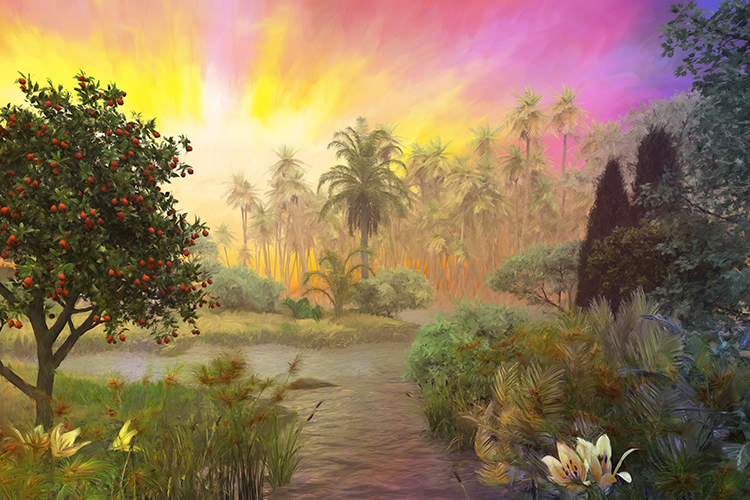
4- Sun, moon, and stars
“Then God said, ‘Let there be lights in the firmament of the heavens to divide the day from the night; and let them be for signs and seasons, and for days and years; and let them be for lights in the firmament of the heavens to give light on the earth’; and it was so. Then God made two great lights: the greater light to rule the day (the sun), and the lesser light to rule the night (the moon) . He made the stars also. God set them in the firmament of the heavens to give light on the earth, and to rule over the day and over the night, and to divide the light from the darkness. And God saw that it was good. So the evening and the morning were the fourth day” (Genesis 1:14-19).
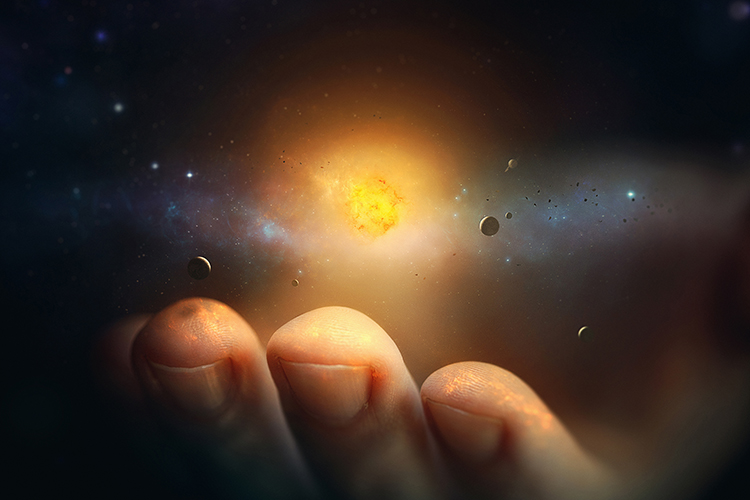
5- Birds & sea animals
“‘Then God said, ‘Let the waters abound with an abundance of living creatures, and let birds fly above the earth across the face of the firmament of the heavens.’ So God created great sea creatures and every living thing that moves, with which the waters abounded, according to their kind, and every winged bird according to its kind. And God saw that it was good. And God blessed them, saying, ‘Be fruitful and multiply, and fill the waters in the seas, and let birds multiply on the earth.’ So the evening and the morning were the fifth day” (Genesis 1:20-23).
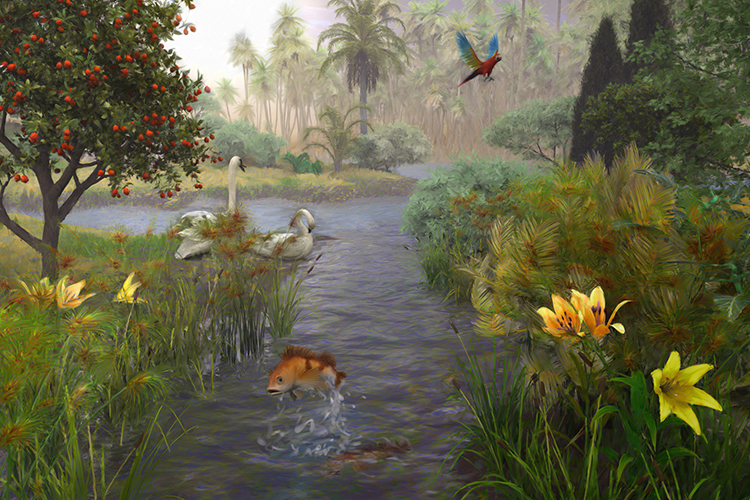
6- Land animals & Humans
“Then God said, ‘Let the earth bring forth the living creature according to its kind: cattle and creeping thing and beast of the earth, each according to its kind’; and it was so. And God made the beast of the earth according to its kind, cattle according to its kind, and everything that creeps on the earth according to its kind. And God saw that it was good.”
“Then God said, ‘Let Us make man in Our image, according to Our likeness; let them have dominion over the fish of the sea, over the birds of the air, and over the cattle, over all the earth and over every creeping thing that creeps on the earth.’ So God created man in His own image; in the image of God He created him; male and female He created them. Then God blessed them, and God said to them, ‘Be fruitful and multiply; fill the earth and subdue it; have dominion over the fish of the sea, over the birds of the air, and over every living thing that moves on the earth.’”
“And God said, ‘See, I have given you every herb that yields seed which is on the face of all the earth, and every tree whose fruit yields seed; to you it shall be for food. Also, to every beast of the earth, to every bird of the air, and to everything that creeps on the earth, in which there is life, I have given every green herb for food’; and it was so. Then God saw everything that He had made, and indeed it was very good. So the evening and the morning were the sixth day” (Genesis 1:24-31).

7- Sabbath- day of rest
“Thus the heavens and the earth, and all the host of them, were finished. And on the seventh day God ended His work which He had done, and He rested on the seventh day from all His work which He had done. Then God blessed the seventh day and sanctified it, because in it He rested from all His work which God had created and made” (Genesis 2:1-3).
It is interesting to note that the seventh day of creation refers to the same day found in the fourth commandment to remember creation by resting on the Sabbath Day (Exodus 20:8-11). “Remember the Sabbath day, to keep it holy. Six days you shall labor and do all your work…For in six days the Lord made the heavens and the earth, the sea, and all that is in them, and rested the seventh day. Therefore the Lord blessed the Sabbath day and hallowed it.”
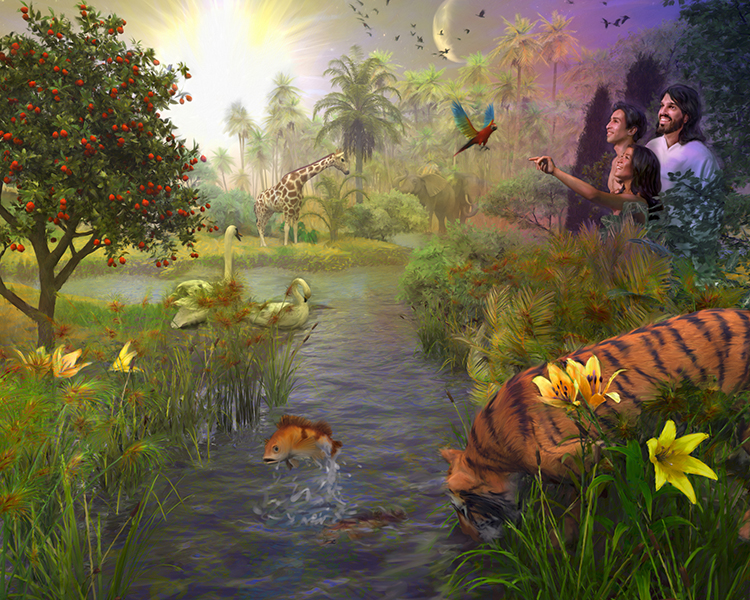
Vegetation (plants) appear on day three and animals appear on day five while geological fossil evidence finds oceanic animals (invertebrates) in the earlier rock layers before vegetation. One ‘save’ for Day-agers claim that perhaps the days of creation were overlapping. This is not only torturing of the text of the bible but:
“it is textual mutilation”.
Davis Young: why he abandoned the day-age theory, February 2006
On day four God created the heavenly bodies after the earth (which was already in existence). This is a vast departure from the worldview of evolutionary ‘science’. The nebular hypothesis is used to describe the formation of such heavenly bodies as stars, galaxies, solar systems, and planets. Astronomy insists that the sun and the stars are much older than earth. The ‘save’ this challenge to the theory Day-agers claim that perhaps the light (created on day one) was actually obscured due to a very thick atmosphere; The newly created atmosphere did not begin to dissipate until the fourth day when the mists ultimately thinned to the point where the sun (and other heavenly bodies such as the moon and stars) became visible from the surface of the earth.
Another argument for the Day Age theory includes that God’s seventh day of creation is still continuing today as evidenced by the expanding universe and evolution (presumed again as true). This argument is self refuting by biblical text in Genesis and Exodus regarding the day of rest and the forth commandment (the Sabbath). In Genesis God rested on the seventh day from all His work which He had done.” Exodus explains within the ten commandments that “in six days the Lord made the heavens and the earth, the sea, and all that is in them, and rested the seventh day.” It seems clear the bible is stating God has completed His creation after day six.
Another, perhaps the strongest argument for Day-age theory is a chronological one. The argument claims that the days must have been longer (than a standard twenty four hour duration) because way too many things transpired on day six for a mere human to accomplish (Adam) on day six which included naming thousands of animals, perceiving his own loneliness, and then God’s creation of Eve.
This does seem like a very busy day but naming animals is not beyond time constraints as we have many kinds and millions of species from these kinds. Additionally, loneliness does not require its separated time from other duties, perhaps it was during the naming of the animals that such loneliness was realized. Of course God’s part of creating Eve from Adam’s rib would take as little time as any of the other events.
“There is no aspect of creationism which is under greater attack by evolutionists than the biblical doctrine of recent creation. The evolutionist, knowing the weakness of the scientific case for evolution, almost always directs his own argument not against creation, but against recent creation and flood geology. As a result, many people who consider themselves creationists have been intimidated against this biblical concept. As far as the biblical record itself is concerned, there is not the slightest indication anywhere in Scripture that the earth endured long ages before the creation of Adam and Eve. The Lord Jesus Christ Himself said: ‘But from the beginning of the creation God made them male and female’ (Mark 10:6).
https://creation.com/recent-creation-is-a-vital-doctrine
In conclusion, man’s attempt to meld together naturalistic concepts such as evolution, billions of year time lines, and chemical emergence of life (abiogenesis) into the biblical creation finds the results irreconcilable and absurd. The atheist reminds such compromised Christians that these attempts render the biblical creation account as clearly illogical based on the “known” order of both cosmological (big bang to planetary formation) and biological evolution. Also, such non-believers will remind those that believe the biblical text that a fully formed and functioning universe from the beginning testifies of a God of deception . Deception because of the appearance of an ancient earth and universe (which is false). Therefore, either way, whether the biblical text is taken more literal or a pure allegory, to the unbeliever biblical doctrine is “babble” and speaking of its truth makes you a “babbler”. In Acts 17:18 philosophers thought what apostle Paul spoke of made him a “babbler”. To the lost ancient people a “babbler” was one who spoke of things that were strange and “out of this world”. Belief in the bible continues to this day to be babble to the lost world. Why strip God of any miracles conveyed to us by scriptures merely to gain approval from either apathetic atheists or compromising Christians? My friends: believe God and doubt man!
1 https://www.icr.org/article/theistic-evolution-day-age-theory/
2 All Images from the days of creation from https://www.bibleinfo.com/en/questions/what-are-7-days-of-creation

